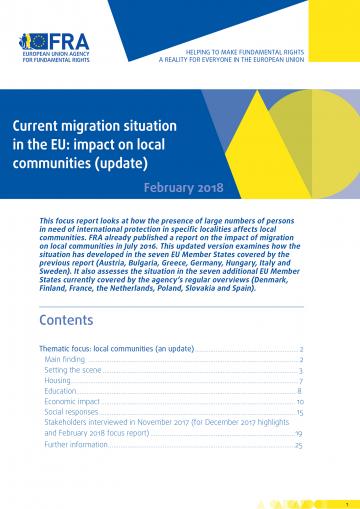Help us make the FRA website better for you!
Take part in a one-to-one session and help us improve the FRA website. It will take about 30 minutes of your time.

Current migration situation in the EU: Impact on local communities (update)
large numbers of persons in need of international
protection affects local communities in terms of
housing, education, the local economy and social
responses.
FRA already published a report on the impact of migration on local communities in July 2016. This updated version examines how the situation has developed in the seven EU Member States covered by the previous report (Austria, Bulgaria, Greece, Germany, Hungary, Italy and Sweden). It also assesses the situation in the seven additional EU Member States currently covered by the agency’s regular overviews (Denmark, Finland, France, the Netherlands, Poland, Slovakia and Spain).
Compared to 2016, the number of asylum seekers generally decreased in the majority of the locations in 2017. However, providing adequate and affordable housing remains one of the main challenges for local communities. Other recurring challenges include tackling negative social responses, supporting (social) integration, providing education and preventing school segregation, providing healthcare, and addressing the transition from education to employment.
There have also been positive developments, particularly the increase in and development of support for asylum seekers by civil society organisations. Promising practices in terms of fundamental rights were also reported in education and language acquisition, employment and labour markets, healthcare, and accommodation. Safety and security for local communities and asylum seekers increased in some locations. Social responses to and perceptions of asylum seekers and refugees have overall been positive. Some local communities specifically welcomed the resulting population increase and the positive effects on local economies.
This report covers:
- Housing
- Community policing concept
- Education
- Economic impact
- Social responses
- Further information
Main findings
- Few stakeholders who were, among others, responsible for certain areas of funding in the respective municipalities were aware of EU funding being used to support local services, initiatives or developments. In several locations, national funding was used to support municipalities providing services and support to people in need of protection.
- Few training courses were organised specifically for local authorities to ensure fundamental rights compliant treatment of persons in need of international protection. Where such training took place, international or national organisations working with migrants and refugees provided it, focusing on vulnerable persons such as unaccompanied children.
- Locations in many EU Member States reported a surplus of places available in accommodation centres in 2017 compared to 2016. This was mainly due to a decrease in arrivals. As a result, facilities were closed in some countries. A few EU Member States – including Greece, Spain and Sweden – reported under-capacity in selected locations.
- Several EU Member States reported efforts to distribute asylum seekers evenly across the country. In most countries, asylum seekers are accommodated by the authorities in charge, and cannot choose where to live. In some countries, asylum seekers have to stay in reception centres, at least initially.
- According to the interviewed stakeholders, the place of living significantly affects asylum seekers’ ability to integrate with local communities and to access essential necessities for integration such as the labour market.
- In many EU Member States – including Austria, Denmark, the Netherlands, Poland and Slovakia – some accommodation facilities for asylum seekers are situated at the periphery of cities, a factor the interviewed stakeholders considered problematic for integration.
- Access to compulsory school is ensured in a significant number of EU Member States. Access to secondary and tertiary education is limited
- Local actors reported both several challenges and good practices in education regarding language issues and introductory classes, training of teachers, specific support forasylum-seeking children and their families, segregation in education, and coordination orcommunication between stakeholders working in the field of education.
- Locations in most EU Member States reported increasing turnover for existing businesses–such as small shops and hotels – attributed to purchases by support staff and, to a lesserextent, refugee customers as well as people engaged in public works.
- New jobs have been generated in counselling and support services and in relation to themanagement of reception facilities and public works, according to local actors of selectedlocations in Austria, Denmark, Finland, Slovakia, Spain and Sweden. Asylum seekers andrefugees also set up new businesses, according to local actors in Austria, Bulgaria andSweden.
- Unclear residence status and language issues remained the main obstacles for businessesto employ asylum seekers. While asylum seekers often face employment-related restrictions due to their residence status, practical obstacles also affect the employment ofprotection status holders. These include: language skills, type and level of qualifications,professional training and support needs, and the recognition of diplomas and qualifications. Additional barriers to employment include: the lack of affordable housing andtransport, hidden xenophobia, bureaucratic hurdles for employers, as well as unattainableexpectations (wage, type of work) on the part of asylum seekers and refugees. In addition, a number of asylum seekers experience difficulties as a result of trauma they haveexperienced and continue to endure, which impedes their access to the labour market.
- Volunteer activities generally continued at a high level or slightly decreased. Some locations reported improved organisation and cooperation among established and new organisations.
- Local populations have maintained overall positive attitudes towards asylum seekers andrefugees, maintaining friendly relations or perceiving them as largely enriching their communities, as reported in selected locations in Bulgaria, Finland, France, Germany, Greece,the Netherlands, Spain, Sweden and, to a lesser extent, Slovakia.
